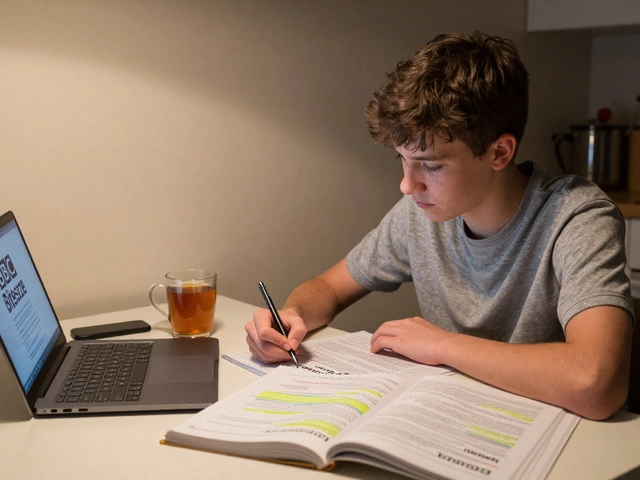- Steady energy beats sugar spikes: low-GI carbs + protein + healthy fats help focus and memory.
- Best picks: oats, eggs, oily fish, berries, nuts, yogurt, bananas, wholegrain bread, beetroot juice, coffee/tea (in moderation).
- Eat a balanced breakfast 2-3 hours before the exam; carry a simple carb + protein snack for the break.
- Hydrate: 500-700 ml water in the 2 hours before, then sip. Moderate caffeine (1-3 mg/kg) can sharpen focus.
- Skip heavy, greasy, or super-sugary foods right before the test. Test-drive any new food on a study day first.
What “brain foods” actually do (and how to choose)
You don’t need exotic powders to think clearly under pressure. You need foods that keep blood sugar steady, support neurotransmitters, and improve blood flow to the brain. That’s it. The trick is pairing slow carbs with protein and colour-rich plants so your energy lasts the whole paper.
Here’s a quick way to choose:
- Steady fuel: low-glycaemic carbs (porridge oats, wholegrain bread, sweet potato) release glucose slowly, which helps attention mid-morning. UK school studies have shown low-GI breakfasts improve memory and attention later in the morning (Benton, 2003).
- Neurotransmitter builders: protein gives tyrosine (for dopamine) and choline (for acetylcholine). Eggs, yogurt, beans, tuna, and chicken are simple wins.
- Membrane and anti-inflammatory support: omega-3s (EPA/DHA) from salmon, mackerel, trout. Evidence in young adults is mixed but points to modest attention benefits if intake is low (Cochrane Review, 2012; updates note small effects in deficient groups).
- Blood flow and antioxidant support: berries (anthocyanins), dark chocolate (cocoa flavanols), and beetroot (nitrates) can improve cerebral blood flow and certain attention tasks (Scholey et al., 2010; Wightman et al., 2015; small RCTs in teens show short-term benefits with blueberries).
- Hydration: even 1-2% dehydration can dent memory and attention (Armstrong, 2012). Water is the baseline. Add a pinch of sodium if you sweat easily or it’s warm.
- Caffeine, done right: small to moderate doses sharpen alertness without big jitters. The European Food Safety Authority puts single safe doses for adults at up to 200 mg, with daily up to 400 mg; for teens, keep it modest (~3 mg/kg) (EFSA, 2015). Pairing caffeine with L-theanine (found in tea) can smooth the edges (Haskell et al., 2008).
My rule as a dad in Dublin who’s shepherded more than a few Leaving Cert breakfasts: if it tastes normal, sits well, and you could make it half-asleep, it’s an exam-day food. Save experiments for after.
The best brain foods for study and exam day
Here are the heavy hitters-easy to find in Irish shops, budget-friendly, and tested by real students. These aren’t magic bullets; they’re reliable, boring heroes. And boring is perfect on test day.
| Food | Key nutrient(s) | Why it helps | Best timing | Student-friendly portion |
|---|---|---|---|---|
| Porridge oats | Low-GI carbs, beta-glucan fibre | Steady glucose for attention; gentle on stomach | Breakfast 2-3 h before | 60-80 g dry oats cooked (about 1-1.5 cups cooked) |
| Eggs | Protein, choline, B12 | Builds neurotransmitters; keeps you full | Breakfast or lunch | 2 eggs (boiled/scrambled) |
| Oily fish (salmon, mackerel, trout) | EPA/DHA omega-3 | Membrane health; supports attention if intake is low | Dinner night before or lunch | 100-150 g fillet or tinned |
| Berries (blueberries, blackberries) | Anthocyanins, vitamin C | Acute attention/memory bump in some studies | Breakfast or 60-90 min before | 100-150 g (fresh or frozen) |
| Yogurt (Greek/Natural) | Protein, calcium | Protein for steadier energy; easy to digest | Breakfast/snack | 150-200 g pot |
| Nuts (walnuts, almonds) | Healthy fats, magnesium | Sustained energy; pair with fruit for balance | Snack | 25-30 g (small handful) |
| Banana | Easy carbs, potassium | Fast fuel that won’t upset stomach | 30-60 min before or mid-exam break | 1 medium |
| Wholegrain bread | Low-GI carbs, fibre | Steady energy; holds protein nicely | Breakfast/lunch | 2 slices |
| Dark chocolate (70%+) | Cocoa flavanols, small caffeine | Attention/mood bump; quick morale lift | 60-90 min before or break | 10-20 g (2-3 squares) |
| Beetroot juice | Dietary nitrate | May improve blood flow to brain | 2-3 h before | 250 ml shot |
| Coffee or tea | Caffeine; tea adds L-theanine | Sharper focus; tea = smoother buzz | 60-90 min before | Coffee 1 small mug (80-120 mg); tea 1-2 mugs |
Best for / not for, at a glance:
- Oats: best if you need long, calm energy. Not for coeliacs unless using certified gluten-free oats.
- Eggs: best for focus + fullness. Not for those with egg allergy; swap for Greek yogurt or tofu.
- Oily fish: best the day before for omega-3 top-up. Not for those who get fishy burps right before tests; try tinned tuna or plant options for dinner, not breakfast.
- Berries: best for a gentle mental lift. Not for those who find seeds annoying-use smoothies.
- Nuts: best for portable protein/fat. Not for nut-free schools-pack seeds (pumpkin/sunflower) instead.
- Beetroot juice: best when you’ve trialled it. Not for sensitive stomachs; it can, ahem, speed things up.
If you’re thinking, “Which are the actual brain foods I should buy today?” start with oats, eggs, frozen berries, Greek yogurt, a nut mix, wholegrain bread, a couple of bananas, and a tin of salmon or mackerel. That covers breakfast, snacks, and a solid dinner.

Exact meal plans: day before, breakfast, and on-the-go snacks
Food needs to be predictable on exam day. Here’s a simple playbook that fits most schedules, whether you’re sitting the Leaving Cert in Dublin or uni finals in Galway.
Day before (steady, not saintly):
- Lunch: wholegrain sandwich with chicken/turkey/tuna, salad, and hummus. Add an apple.
- Snack: yogurt with frozen blueberries; or oatcakes with cheese.
- Dinner: salmon or mackerel with baby potatoes and greens (broccoli/spinach). Not into fish? Chicken stir-fry with peppers and cashews works. Vegetarian? Lentil dal with basmati rice and a spoon of yogurt.
- Evening nibble (optional): a few squares of dark chocolate or a small banana if you’re studying late. Stop eating 2-3 hours before bed for better sleep.
Exam morning (2-3 hours before you start): pick one “main” and one “topper”.
- Main options:
- Irish porridge made with milk (or fortified oat/soya drink), topped with banana and a spoon of peanut butter.
- 2 eggs on wholegrain toast with tomatoes or spinach.
- Greek yogurt bowl with oats, frozen berries, and a drizzle of honey.
- Topper options (choose one):
- 1 small mug of coffee or 1-2 mugs of tea (try green tea if coffee makes you jittery).
- 250 ml beetroot juice shot if you’ve used it before without tummy trouble.
- Water: 300-500 ml with a pinch of salt if it’s warm or you’re nervous-sweating.
One hour before the exam:
- If you ate early and feel a dip: have a small banana or a slice of wholegrain bread with a thin layer of peanut butter or cheese. Keep it light.
- Small tea or water sip. Avoid “topping up” with a big coffee now-it can peak during the first section and crash mid-paper.
Packable snack combos for breaks (or just after):
- Banana + 10 almonds (or pumpkin seeds if nut-free).
- Small yogurt + 1 tbsp oats + a few berries in a lidded tub.
- Wholegrain crackers + cheese triangle.
- Apple slices + peanut butter sachet.
- 2-3 squares dark chocolate + water.
“I’ve only got 10 minutes before I go in.”
- Drink a glass of water.
- Eat half a banana or a few crackers. That’s enough to settle nerves and keep glucose stable without a sugar crash.
“I’m sitting two papers in one day.”
- Between papers: drink water; eat a simple carb + protein combo (half a chicken or cheese sandwich; or yogurt + oat bar). Skip greasy takeaways. Walk for 5 minutes to reset.
Hydration, caffeine, and quick boosts (without the crash)
Hydration plan:
- Evening before: drink normally; aim for pale yellow urine. No need to chug water at night.
- Morning: 300-500 ml with breakfast; another 200 ml an hour later.
- Pre-exam: 200 ml 15-20 minutes before you go in, then small sips if allowed. Don’t overdo it-you don’t want a bathroom sprint mid-question.
Caffeine plan (coffee, tea, or none):
- Know your dose: 1-3 mg/kg sharpens attention for most people. For a 60 kg student, that’s ~60-180 mg (about 1 small mug of coffee or 1-2 mugs of tea). Don’t stack energy drinks on top.
- Timing: 60-90 minutes before you need peak focus. Caffeine lasts 3-5 hours in most people.
- Tea advantage: the L-theanine in tea smooths jittery edges. Many students find two strong teas feel steadier than one strong coffee (Haskell et al., 2008).
- Cut-off: if you have afternoon papers, keep the morning caffeine modest so you don’t crash. If you’re sensitive or anxious, skip caffeine and rely on food, hydration, a splash of cold water on your face, and a brisk walk.
Quick boosts that actually help:
- Beetroot juice: take 250 ml 2-3 hours before the exam. Trial it on a study morning to check tolerance. Some small trials show better attention and blood-flow markers (Wightman et al., 2015).
- Blueberries: 100-150 g 60-90 minutes before may give a small cognitive lift in some teens; either in yogurt or blended into a smoothie.
- Dark chocolate: 10-20 g about an hour before can lift mood and alertness without a sugar crash.
Things that backfire:
- Huge coffees right before the exam-jitter city, then a slump.
- Energy drinks on an empty stomach-fast spike, fast crash, shaky hands. Not ideal for essay handwriting.
- Chugging water at the door-discomfort and distraction.
Safety note: EFSA (2015) sets adult daily caffeine up to 400 mg as generally safe; teens should stay around 3 mg/kg. If you’re on meds, pregnant, or have a heart condition, talk to your GP and keep caffeine low.

Special cases, budget swaps, and common pitfalls
Vegan or vegetarian:
- Protein: tofu scramble on toast; Greek-style soya yogurt; beans on wholegrain toast.
- Omega-3: walnuts, chia, and flax give ALA; if you don’t eat fish, consider an algae-based DHA supplement started weeks earlier. Food-wise for exam day, keep it simple: oats + plant yogurt + chia + berries.
Gluten-free:
- Use certified GF oats or a rice/quinoa porridge. Swap bread for GF wholegrain crackers or GF toast. Potatoes and basmati rice are naturally GF and reliable.
Lactose-free:
- Use lactose-free milk or fortified plant drinks (soya for protein; oat for creaminess). Choose lactose-free yogurt or Skyr-style lactose-free options.
Nut-free schools:
- Swap nuts for roasted chickpeas or seeds (pumpkin/sunflower) if allowed. Check your centre’s policy; when in doubt, choose yogurt, cheese, or egg-based snacks.
Halal/Kosher:
- Eggs, dairy, plant proteins, and fish with scales (e.g., salmon, trout) are straightforward options. Pre-check labels on deli meats and yogurts for gelatine or non-compliant enzymes.
Stomach nerves:
- Go bland: porridge, banana, yogurt, toast with a thin layer of peanut butter or jam. Skip chilli, garlic, and heavy fried breakfasts.
No kitchen? (halls/dorm life):
- Microwave oats pots; Greek yogurt + frozen berries; tinned fish + wholegrain crackers; pre-cooked rice pouches + beans. All available in Irish supermarkets.
On a budget in Ireland:
- Frozen berries are cheaper than fresh and just as effective.
- Tinned mackerel/salmon is far cheaper than fillets and lasts in the cupboard.
- Buy big tubs of natural yogurt; add fruit and oats yourself.
- Oats are pennies per bowl and power you for hours.
Common pitfalls to avoid:
- Skipping breakfast, then over-caffeinating. You’ll shake through Section A and fade in Section B.
- Big greasy fry-ups on test day if you’re not used to them. Heavy meals slow you down.
- New supplements the night before. If something’s going to upset your stomach, it will do it when you least want it to.
Supplements, briefly (if you insist):
- Fish oil (EPA/DHA): helps if your normal intake is low, but it’s not an instant fix. Start weeks before, not the night before (Cochrane, 2012).
- Creatine: can help thinking speed in sleep-deprived folks and vegetarians in some studies (Rae et al., 2003). Dose 3-5 g/day; start at least a week before. Not needed for most.
- Magnesium, B-complex: useful if you’re deficient, not a same-day performance booster. If you eat varied foods, you’re likely fine.
Mini-FAQ
Q: Is coffee or tea better for exams?
Tea is gentler because of L-theanine. If coffee makes you jittery, go with two strong teas spaced an hour apart.
Q: Do energy drinks help?
They help short-term but can cause jitters and a crash. If you use them at all, have them with food and keep to a small can. For most students, coffee/tea with a snack is cleaner.
Q: What should I eat if my exam is at 2 p.m.?
Have a late, balanced breakfast (oats or eggs on toast) around 10-11 a.m., then a light snack (banana + yogurt) at 12:30-1 p.m. Sip water through the day.
Q: Does chocolate really help?
Dark chocolate (70%+) has cocoa flavanols that can lift alertness. Keep it small-10-20 g about an hour before.
Q: I’m fasting (e.g., Ramadan). Any tips?
At Suhoor, choose low-GI carbs, protein, and hydration with electrolytes. Keep caffeine low if it dehydrates you. Plan a brief mental warm-up before the exam to wake the brain.
Q: What if I don’t feel hungry in the morning?
Blend a small smoothie: milk or soya drink, oats, banana, handful of frozen berries. Sip it. It’s easier than chewing when nerves are high.
Next steps (simple and actionable):
- Pick one breakfast and one snack from the lists and test them this week on a mock or a long study session. If they sit well, lock them in for exam day.
- Write your “exam menu” on a sticky note: breakfast time, drink, packable snack, and water plan.
- Shop list for Ireland: oats, milk/soya drink, bananas, frozen berries, Greek yogurt, wholegrain bread, eggs, tinned salmon/mackerel, nuts or seeds, dark chocolate, beetroot juice (optional).
- Set reminders: drink water with breakfast, pack your snack, brew tea/coffee 90 minutes before the start.
If you remember nothing else, remember this: eat a normal breakfast with slow carbs and protein, sip water, and avoid last-minute sugar bombs. Your brain likes calm and steady. Feed it that, and let your revision do the rest.






